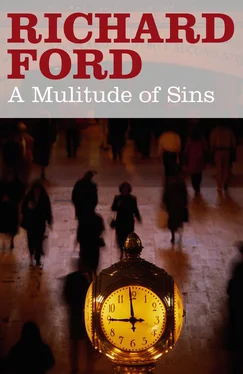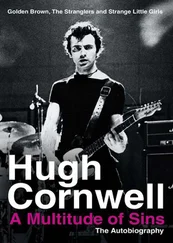“I admit I may like Madeleine more than I ought to,” Henry said and felt satisfied with that. “I may have acted in some ways that aren’t entirely in your interest.”
At this, the young man blinked his lightless brown eyes more rapidly. “Is that so?” he said. “Is this your great admission?”
“I’m afraid it is,” Henry said, and smiled for the first time. He wondered where Madeleine actually was at the very moment he’d admitted to her boy husband, in his own fashion at least, that he’d been fucking her. He’d only done it so that something that passed between himself and this young man could have a grain of substance to it. “What kind of architecture do you do?” he asked companionably. Some people were speaking French close by. He looked around to see who. It would be so nice just to start speaking French now, or Russian. Anything. Madeleine’s husband said something he wasn’t sure he understood. “Excuse me.” He smiled again tolerantly.
“I said fuck you,” the young man said and stepped closer. “If you persist with this, I’ll arrange for something really bad to happen to you. Something you don’t want to happen. And don’t think I won’t do that. Because I will.”
“Well. I certainly believe you,” Henry said. “You have to believe that when someone says it. It’s the rule. So, I believe you.” He looked down at his own white shirt front and noticed a tiny black decoration of Madeleine’s mascara from when she had pressed close to him by the window after crying. It made him feel fatigued all over again.
The young man stepped back now. His face had lost its blush and looked pale and mottled. He had never removed his hands from his pockets. He could have a gun there. Though this was Canada. No one got murderous over infidelity.
“You American assholes,” Madeleine’s husband said. “You’ve got divided inner selves. It’s in your history. You have choices about everything. It’s pathetic. You don’t really inhabit anything. You’re cynical. The whole fucking country of you.” He shook his head and seemed disgusted.
“Take all the time you want. This is your moment,” Henry said.
“No, that’s enough,” the young man said and looked tired himself. “You know what you need to know.”
“I do,” Henry said. “You made that clear.”
Madeleine’s husband turned and without speaking strode off across the festive gilt-and-red lobby and out the revolving doors where the tae kwon do children had gone, disappearing as they had amongst the passersby. Henry looked at his wristwatch. This had all occupied fewer than five minutes.
. .
Back in his room he changed his shirt and arranged his clothes and toiletries into his suitcase. The room was cold now, as though someone had shut off the heat or opened a window down a hallway. Two message slips lay on the carpet, half under the door. These would be from Madeleine, or else they were new, second-thought threats from the husband. He decided to leave them be. Though some insistent quality about the message slips triggered a sudden strong urge to make up the bed, straighten the room, set out the breakfast tray, urges which meant, he understood, that his life was becoming messy. It probably wouldn’t be better until he was on the plane.
But standing exactly where Madeleine had stood earlier, he watched the big T-shaped crane slowly lift a great concrete-filled bucket toward the top of an unfinished building’s high silhouette. He wondered again where, in this strange disjointed city, Madeleine was. Having a coffee with a girlfriend she could regale the day to; or waiting for her son to get out of school, or for the husband to arrive and some brittle, unhappy bickering to commence. Nothing he envied. On the window glass, he saw where she’d been writing with her finger; it showed up now that the air in the room was colder. It seemed to say Denny. What or who was Denny? Maybe the message was someone else’s, some previous hotel guest.
And then, for no apparent reason he felt exhausted to the point of being dazed. Sometime, too, in the last hour, he had cracked off a sizeable piece of a molar. The jagged little spike caught at the already-tender tip of his tongue (the broken part he’d swallowed without knowing it). The day had worked its little pressures. He took off his glasses and lay down across the newspapers. He could hear a muffled TV in another room, a studio audience laughing. There was time to sleep for a minute or five.
About Madeleine, though: there had been a time when he’d loved her, when he’d said he loved her, felt so rather completely. None of the foolishness about love or being in love. One definite time he could remember had been on a pebbly beach in Ireland, near a little village called Round Stone, in Connemara, on a trip they’d made by car from Dublin, where they’d seen investors and negotiated significant advantages for the client. They’d laid a picnic on the rocky shingle and, staring off into the growing evening, declared the lights they could see to be the lights of Cape Breton, where her father had been born, and where life would be better — though in true geography, they’d been facing north and were only viewing the opposite side of the bay. Behind them in the village, there’d been a little fun fair with a lighted merry-go-round and a tiny bright row of arcades that glowed upward as the night fell. There, that time, he’d loved Madeleine Granville then. And there were other times, several times when he knew. Why even question it?
Even then, however, there was always the “Is this it?” issue. Thinking of it made him think of his father again. His father had been a born New Yorker, and had retained New Yorker ways. “So, Henry. Is this it for you?” he’d say derisively. His father always felt there should be more, more for Henry, more for his brothers, more than they had, more than they’d settled for. To settle, to not overreach was to accept too little. And so, in his father’s view, even if all was exquisite and unequaled, which it might’ve seemed, would it still get no better than this in life? Life always had gotten better. There’d always been more to come. Although, he was forty-nine now, and there were changes you didn’t notice — physical, mental, spiritual changes. Parts of life had been lived and never would be again. Maybe the balance’s tip had already occurred, and something about today , when he’d later think back from some point further on, today would seem to suggest that then was when “things” began going wrong, or were already wrong, or was even when “things” were at their greatest pinnacle. And then, of course, at that later moment, you would be up against something. You’d be up against your destination point, when no more interesting choices were available, only less and less and less interesting ones.
Still, at this moment, he didn’t know that; because if he did know it he might decide just to stay on here with Madeleine — though, of course, staying wasn’t really an option. Madeleine was married and had never said she wanted to marry him. The husband had been right about choices, merely wrong in his estimation of them. Choices were what made the world interesting, made life a possible place to operate in. Take choices away and what difference did anything make? Everything became Canada. The trick was simply to find yourself up against it as little as possible. Odd, Henry thought, that this boy should know anything.
In the hall outside the room he heard women’s voices speaking French very softly. The housekeepers, waiting for him to leave. He couldn’t understand what they were saying, and so for a time he slept to the music of their strange, wittering language.
Читать дальше












